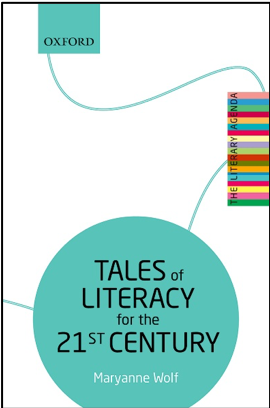Publication Details
| OLOR Series: | ROLE Reviews |
| Author(s): | Lauren Stepp |
| Original Publication Date: | 15 March 2018 |
| Permalink: |
<gsole.org/olor/rolereviews/2018vol1no1.rev5> |
Publication Note
This review was originally published in Research in Online Literacy, vol. 1, no. 1 (2018).
Resource Overview
Media, Figures, Tables |
Resource Contents
Review of Tales of Literacy for the 21st Century
For most adults, processing language is second nature so that we often forget the phonetic fumbling—sounding out one-syllable words and laboring over multi-clause sentences—that brought us to this point. Jaded by our literacy, we ignore one simple assumption: Humans are not designed to read. At least, that is what decorated scholar Maryanne Wolf argues in her text Tales of Literacy for the 21st Century.
"The brain that reads is not a given," she boldly proposes (p. 3). Wolf explains that we are equipped with eyes, ears, and specific neurological structures, but literacy is still cultural. Like riding a bike, it is more nurture than nature. That means most research is largely qualitative and anecdotal. Undeterred, Wolf collates the information that is available. She pulls from psycholinguistics, child development, and cognitive neuroscience to walk readers through six stories related to reading. The structure is logical. She begins by describing the basics: phonology, pragmatics, syntax, semantics, and morphology (otherwise known by its abbreviation "possum"). It is obvious that Wolf has tried to make the text inclusive of all readers, beginning chapters with interesting narratives and providing simple analogies for intricate concepts, but that accessibility fades when she begins discussing how literacy affects the brain's physiology.
Consider the following passage in “A Neuroscientist's Tale of Words.” When discussing how the brain processes written words, such as the word “brain,” Wolf writes, "specific parts (lateral and medial) of extrastriate cortex appeared activated….in this case, the same extrastriate regions were once again activated, along with what are called the fusiform and lingual gyri" (p. 89) [italics in original]. She provides a cartoonish diagram in the following pages, yet she fails to define exactly what the "fusiform" and "lingual gyri" are. Though interesting to see how Charlotte's Web might change the noggin, this topic is too technical for a general audience. Unless, of course, Wolf is writing for subject matter experts in her field. If so, that is unclear. Because, for better or for worse, she begins the book using simplified terms. “A Linguist’s Tale” and “A Child’s Tale,” both of which discuss how we learn to read, are relevant beyond academia. I can easily see practical applications for teachers, new parents, government officials, and nonprofit executives. “A Tale of Hope for Non-Literate Children,” a chapter that unpacks advancements in early childhood education, adopts a similar accessibility. But the training wheels come off in the 100 pages in between, and I fear that the average person might get lost or give up altogether.
Still, I applaud Wolf. Tales of Literacy for the 21st Century provides readers with ample background information before building up to discuss case studies that use apps and tablets as reading tools. Rather than writing off digital culture as an impediment to learning—a view that is expected and trite in today’s age—Wolf argues technology’s potential. It is a refreshing perspective that is sure to foment productive discussion. Ergo, I suggest Wolf’s text for anyone invested in education, provided that they can look beyond the dense and sometimes conflated subsections.
Tales of Literacy for the 21st Century
Maryanne Wolf. 2016. Oxford: Oxford University Press. [ISBN 978-0-19-1872417. 200 pages, including index. US$24.95 (softcover)].
About the Reviewer
Lauren Stepp is an award-winning journalist with bylines in arts and culture magazines across Western North Carolina. She is also known for her nonprofit development work, having composed six-figure grants and delivered training seminars for stakeholders across 532 American cities. She holds a B.A. in English from Western Carolina University.



